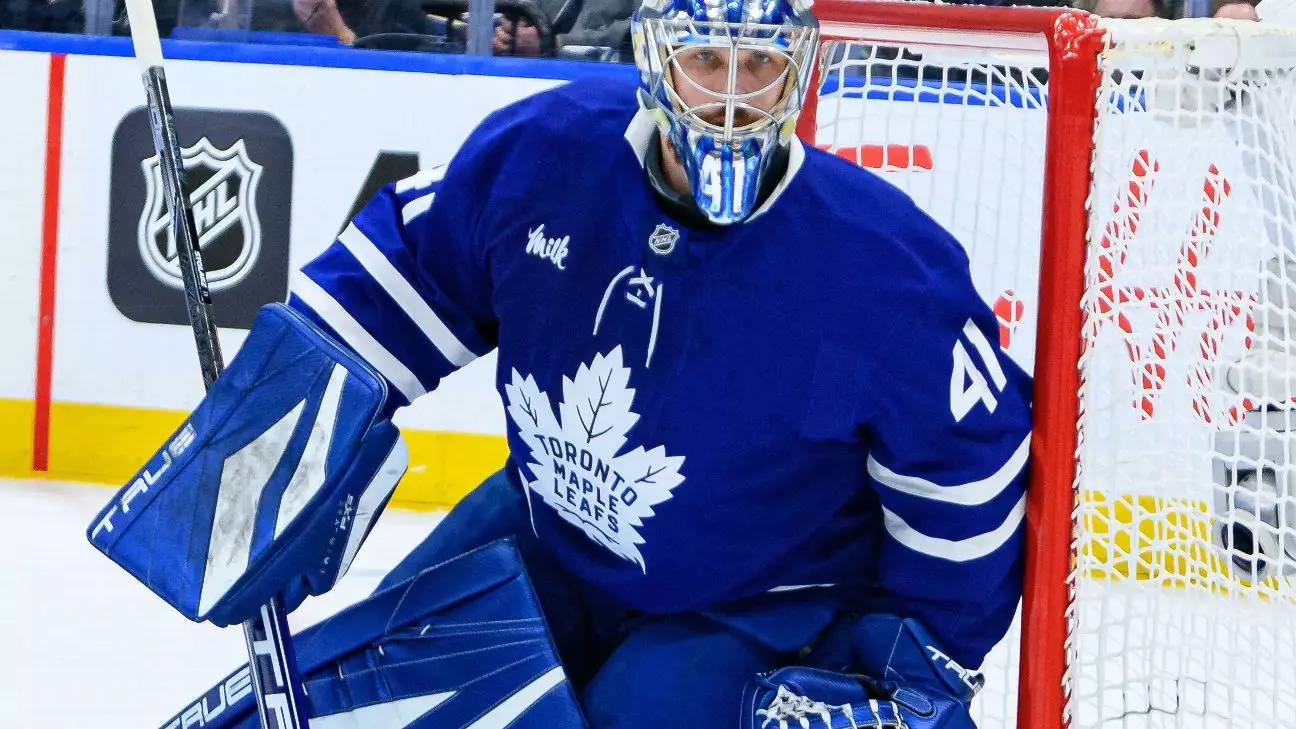In the high-stakes world of NHL playoffs, physical endurance and mental fortitude are paramount. These traits were put to the test recently when Toronto Maple Leafs goaltender Anthony Stolarz found himself in a precarious situation during a tightly contested matchup against the Florida Panthers. The sudden and alarming sequence of events when he took a blow to the head serves as a stark reminder of the sport’s ferocious nature. Fortuitously, Stolarz’s return to the practice facility the following day sparked a minor resurgence of hope among the Maple Leafs community, despite the lingering uncertainty about his condition.
The emotional roller coaster that accompanies the playoffs can become almost palpable—not just for the players but for fans as well. The fact that Stolarz was later seen smiling highlights the resilience inherent to athletes, even when facing potential career-altering injuries. Yet underneath that veneer of strength lies a question that haunts every playoff season: Can we truly gauge the long-term impact of a concussion, particularly in a player who has just begun to carve out his playoff legacy?
The Unpredictable Nature of Injuries
Anthony Stolarz’s experience injects a compelling layer of complexity to the conversation about injuries in hockey. The elbow from Sam Bennett that left Stolarz disoriented and ultimately led to his departure from the game was more than just a physical blow; it was an emotional one as well. In a moment’s notice, the dynamics of a playoff series can shift dramatically. As head coach Craig Berube painfully articulated, the information surrounding Stolarz’s potential concussion is vague at best, which serves as a metaphorical roulette for the entire team heading into crucial games.
Backup goaltender Joseph Woll’s prior performances help alleviate some immediate fears surrounding Stolarz’s absence. Having been thrust into the spotlight during previous playoff campaigns, Woll embodies the unpredictability of a goaltender’s role—both a backup and a lifesaver in dire circumstances. The encouragement from teammates, particularly defenseman Jake McCabe, highlights the unity that can be fostered during moments of uncertainty. Confidence in a backup can often translate to collective resilience, especially in high-pressure playoff situations.
Strategic Play in High-Stakes Competition
Discipline becomes crucial when one’s team is threatened, as Berube aptly reminded his squad. The instinct to retaliate against Bennett could easily become counterproductive. NHL history is replete with instances where emotions took over and led to ill-timed penalties, costing teams valuable playoff runs. The strategic nuances in such moments reflect a rich tapestry of both physicality and mental strategy that coaches like Berube must navigate. The former player’s nostalgia for an era where a swift retribution would have been the norm adds another layer to the game’s evolution.
The Maple Leafs face a classic conundrum typical of playoff hockey: balancing aggression while avoiding unnecessary penalties. This delicate tightrope walk defines the play of a disciplined team; they must remain composed while still feeding off the high energy that such playoff series naturally provide.
The Weight of History in the Making
Stolarz’s experience in the playoffs is notable as it marks his inaugural venture as a reliable starter at this pinnacle level. This journey bears weight not only for Stolarz personally but also for the Maple Leafs franchise, which is continuously in pursuit of a championship. Having previously shadowed veteran goaltender Sergei Bobrovsky with the Panthers, Stolarz’s transition to the Maple Leafs offers a fascinating glimpse into how players evolve throughout their careers. As he navigates this critical moment, he represents both personal ambition and collective aspiration within a franchise that has not tasted victory for decades.
In a playoff atmosphere thick with anticipation, Stolarz and his teammates are emblematic of the larger storylines that define the postseason—those of hardship, determination, and the ultimate quest for glory. Whether he appears in the next game or not, Stolarz’s presence, resolve, and potential to return embody the intricate dance between hope and uncertainty that characterizes professional sports.


Leave a Reply